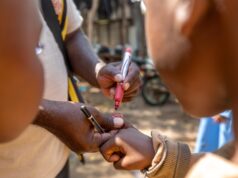A Kenyan seeking state service is likely to be asked for a bribe 1.41 times while seeking security from a police officer, a new survey reveals.
The Ethics and Anti-corruption survey report for 2023, shows that police services are the most bribery-prone.
The report released on Wednesday shows that one is likely to pay a bribe 1.28 times while seeking bail for arrested persons.
Reporting a crime and writing a statement with the police would see a Kenyan pay a bribe 1.1 times while undergoing a driving test would attract the same 1.0 times.
Registration of business, according to the report, would see Kenyans asked for a bribe 1.0 times.
Following up on a case with the police or seeking to dismiss one would attract a bribe at 1.0 times just like seeking relief food, obtaining tender, transfer of vehicle collection of construction certificate and education service.
Attracting a bribe 1.0 times includes: seeking a driving license, a scholarship, CDF bursaries, agricultural extension services, and social protection cash transfers as well as seeking a transfer of a pupil from one school to another.
“Obtaining a P3 form would see Kenyans pay a bribe 0.98 times, seeking a police abstract would see one pay a bribe 0.97 times and seeking a business permit 0.93 times,” EACC report showed.
According to the report, Kenyans seeking medical attention would see Kenyans pay a bribe 0.92 times.
Applying for a passport would attract a bribe 0.91 times, collection of a land title deed 0.89 times, obtaining a reference letter 0.88 times, and applying for a birth certificate 0.87 times.
Others are obtaining subsidized fertilizer (0.87), application for a bursary (0.87), collection or renewal of ID(0.81), release of impounded goods( 0.77), seeking employment (0.73), seeking Uwezo Funds(0.71), Public Health Certificate (0.70) and NHIF application at 0.70 times.
Others are KRA pin application (0.67), obtaining a burial permit (0.67), seeking police good conduct (0.65), changing ID particulars (0.62), solving land conflict (0.60), power connection(0.54), acquiring a visa(0.49), water connection (0.48) and obtaining a death certificate at 0.44 times.
The sample size for the survey was computed at 5,100 individuals drawn from 510 clusters distributed across all 47 counties;
Data collection was preceded by a questionnaire design while two days of training were held between October 11-12, 2023.
Twenty-five research assistants, supervisors, and KNBS coordinators were trained to enhance the quality of data collected.
During the training, the participants were briefed about the EACC mandate, the purpose and objectives of the Survey, data collection methods, and the implications of the analysis.
As part of practical training, the research assistants carried out a pre-test of the questionnaire. Feedback from the pre-test helped in the revision and refinement of the questionnaire.
Data collection was conducted from October 13 to November 4, 2023.
Both quantitative and qualitative research methods were used. Computer Assisted Personal Interviews (CAPI) were conducted with household heads with a literature review providing critical insights into topical issues on anti-corruption.


















